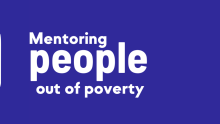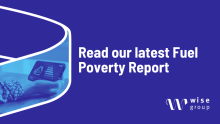Fuel poverty smells of damp clothes and mouldy walls, it feels like cold bones and tastes of another missed meal. We recognise what it looks like too – poorly insulated homes, damaged roofs, worried families. But what can fuel poverty sound like? Earlier, as I sat down with some of our customers in the North East of England, the most distinctive sound was laughter.
As people shared stories of “drafts so strong they blow doors open”, and about the random jumble of slippers, onesies and coats you would wear to keep warm, it was a relief to know you were not alone. For many, it is embarrassing to talk about your struggle with friends, neighbours and family, never mind strangers, so facilitating such conversations is crucial in helping people to voluntarily reach for support. But the laughter stopped as we discussed a more familiar sound of fuel poverty, one which too many people encounter when they take that first step to seek support – “I’m sorry but it’s not my job”.
Across the group, everyone shared that rejection of support from local authorities, suppliers and other bodies was a common experience – even when support measures were technically available. Bodies that do have mechanisms of support were described as requiring an innate knowledge of a maze of procedures and processes which even those inside the organisations fail to grasp. Often, reaching out to local authorities and suppliers is a last resort for those struggling with fuel poverty. It is deafeningly clear that customer-facing individuals across organisations which deal with vulnerable individuals must have a mature model of signposting to existing support.
With energy costs rising at an unprecedented rate, another sound is the beeping of prepayment meters as they alert families, often in the dead of night, that they have run out. In situations like this, emergency loans of as little as £5 are often all that is on offer, staving off another round of beeping by a couple of days if not less.
One individual, who worked as a welder across the world until recently, spoke about how he lives on £127 a fortnight. Within this budget, he spoke of how essential it was to set aside money for a mobile phone contract, describing it as a “lifeline” to services without which he would be “lost”. His incredibly tight budget means that he already is stretched beyond the limit, saying that he “can’t save anymore” to provide for the steep rise in energy bills.
Individuals turned to ration and self-disconnection to plug the gap – a situation which will only be made more extreme as energy prices rise. Doing so means that these customers sometimes fail to register as vulnerable to suppliers – though even when customers reach out for Smart Meters, which could better support and identify their energy needs, this is sometimes out of reach.
In one case, a customer was denied access to smart meters on the grounds that their current meter is not safe to access for an installation. Nevertheless, the risk of injury for the customers accessing the current meter is deemed acceptable. Reported installation fees for smart meters of £40 also marginalise those who may benefit most from tracking their usage and excludes this vulnerable group from a means of data collection which may highlight them as in need of support.
Despite households across the country barely making ends meet, it was clear that the wider community is playing a vital role in offering support in the most extreme cases. One in the group said that she will “go over to my neighbours to get a bath just to warm up my bones”, another that they will help neighbours out with money if they have extra to top up meters. April 1 nears, communities across the country will need organisations to prioritise value-based decision making and change the sound of fuel poverty to “that’s my job”.
You can read more about the work the Wise Group does with households across the UK in our energy report found here: https://www.thewisegroup.co.uk/reports/














